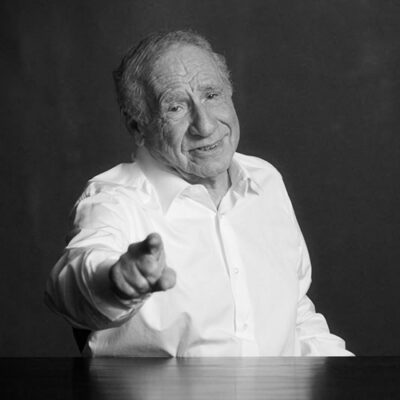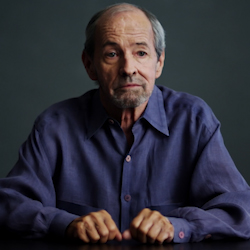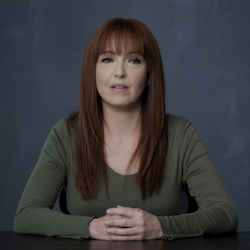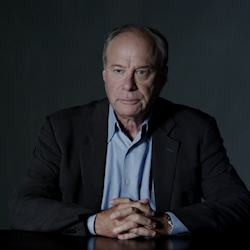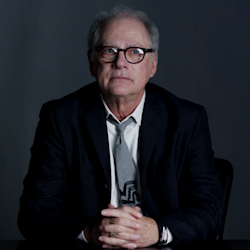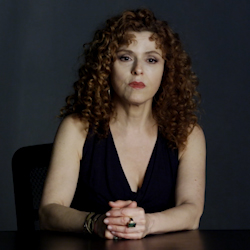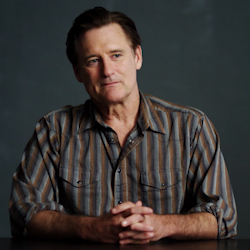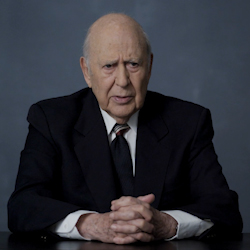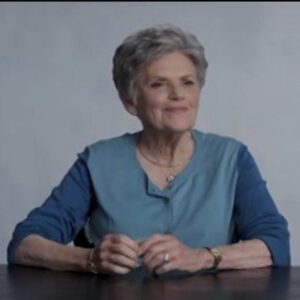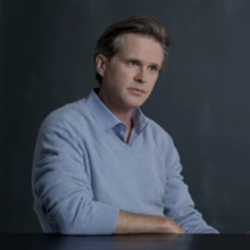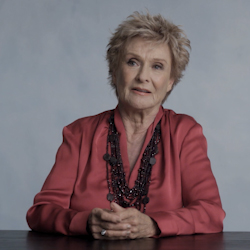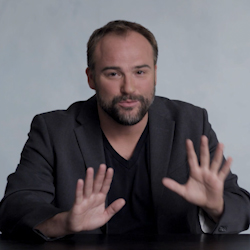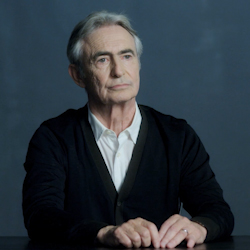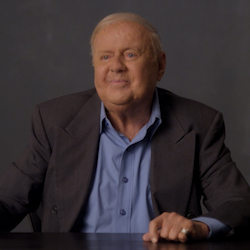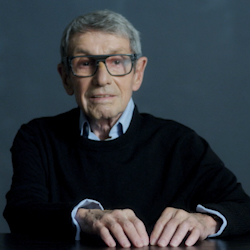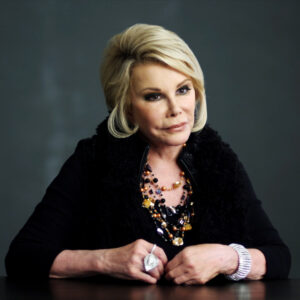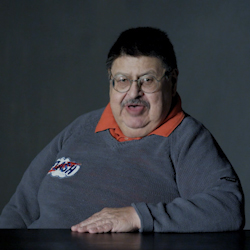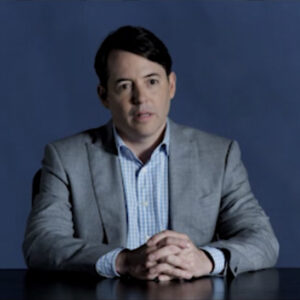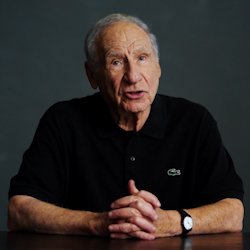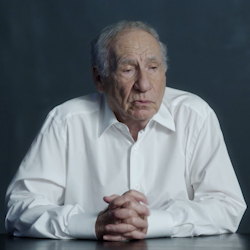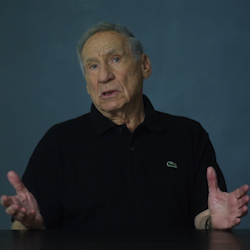Interviewer: Tell us how you first met Mel.
Alfa-Betty Olsen I knew him from Fire Island. And one day he said, you can type and I can’t. And I have to hand this in on Monday. You have to help me. So I started working for him. That’s it.
Interviewer: And and what year was that?
Alfa-Betty Olsen You know, I have no idea, but I know that I worked over at Talan Associates with Mel and Buck. They had their little room. And I sat in the corner and wrote down everything and made manuscripts from conversation.
Interviewer: You know, you can put your hands on the table. That would be.
Alfa-Betty Olsen Oh. OK.
Interviewer: Feel free. And then now when you say you work with Mel and Buck. That was on Get Smart, right?
Alfa-Betty Olsen Yeah. That was. That was a pilot for Get Smart.
Interviewer: So I’m sorry. Just do not. I’m sorry. But tell me that as a complete statement.
Alfa-Betty Olsen Oh well the pilot for a Get Smart was at Talan Associates, which was in at I believe, 444 Madison Avenue. And we had a tiny room and Mel and Buck threw around ideas and jokes and things. And I was the person in the corner at the typewriter. And put together everything they said and handed in my reports.
Interviewer: You know, I think where are you hearing the foot?
Alfa-Betty Olsen Oh, I’m sorry.
Interviewer: That’s okay.
Alfa-Betty Olsen All right. Talan Associates was a fabulous place at that time. People would drop in and say hello at the office like Garçon Kane came by and it was everybody who was, you know, really doing stuff in New York at that time. And they had a poolroom and people could come and shoot pool. And Laurie Noto, who produced The Fantasticks, who grew up in Brooklyn and his father owned a pool room and Laurie could really shoot pool. And he came over and and creamed everybody. But then it made Mel a little nuts. And as he watched the points piling up in Lori’s side, he shot a game that he was not really capable of shooting. I mean, he just rose to the occasion and he won one of the games.
Interviewer: Hold on one second, Chico. Can you fix Alfa-Betty’s hair just. Just see how. Jump in for a second. Perfect. OK.
Alfa-Betty Olsen And I don’t know, oh I should wait. OK,.
Interviewer: What were you going to say?
Alfa-Betty Olsen Oh, I don’t know. I don’t know if Mel told you some of these stories from Talan Associates.
Interviewer: No, he didn’t.
Alfa-Betty Olsen So I. Well, there came a day when we all went down to Madison Avenue and Anne Bancroft came in a cab and picked Mel up and they were going downtown either to get the marriage license or maybe to actually get married. And as the cab pulled away, Buck Henry and I stood on the sidewalk and waved.
Interviewer: So what do you remember about the creation of the Get Smart pilot?
Alfa-Betty Olsen Everyone enjoyed it. It was a lot of fun. It was funny. Mel was funny and Buck was funny and. And it was just fun. There was an initially I don’t know I don’t remember what network it was, but it didn’t get picked up or it didn’t get shot. And then there was a waiting period. And then ultimately, I think it was NBC came in and it was a go.
Interviewer: Was because Mel’s experience from your show shows that everything was sort of a frenetic room with the two of them?
Alfa-Betty Olsen It was a very tiny room. No, it was just very comfortable and nice. And it was like Talan Associates was kind of wonderful. And as I said, people would stop by. I remember I remember George Segal kept coming by and then everybody entertained him. And. And that’s pretty much what it was like.
Interviewer: So from after Get Smart, you were you periodically working with him or?
Alfa-Betty Olsen Well, then I worked with him when he was going to do The Producers and he had pitched it to Sidney Glazer. And then Sidney needed as a treatment to show the investors. So there was a treatment. And then there was the writing of the of the script.
Interviewer: Which he did alone. But with you.
Alfa-Betty Olsen Right. Yeah.
Interviewer: And did you do most of that on Fire Island or?
Alfa-Betty Olsen No, actually, a lot of it was done once again in Laurie NoDoz office. Laurie, let us have the office. And in exchange, I would check on the mail and call them up and tell them what was in his mail. He would come in late in the afternoon and. And we just had the run of the place. We cast it out of his office, too.
Interviewer: Now, you cast the movie, right?
Alfa-Betty Olsen Yeah.
Interviewer: You should say I cast.
Alfa-Betty Olsen I cast the producers out of Lore Noto office.
Interviewer: You know, tell us who Lore Noto is.
Alfa-Betty Olsen Lore Noto produced The Fantasticks, which was the longest running off Broadway show, I believe, ever. I think I worked for him at one point, maybe in its 13th year. And it was downtown at the Sullivan Street Playhouse. It was a hundred and ninety nine seat house. And there was a record breaking show.
Interviewer: Tell us about tell us about casting The Producers.
Alfa-Betty Olsen Let’s see. Well, Zero Mostel was the intended Bialystock from the very beginning. And also Gene Wilder for Bloom. And then we sent out. We contacted all of the agents in New York. We had all of the theater people available to us. And. We would have people would come in and read some people read actually in Lore Noto’s office. It was the movie was very. We were flying by the seat of our pants. You know, there was one point when we were shooting the movie. Mel was directing in the studio on 26 Street. And we had two big problems. It was kind of it was exciting and it was wonderful and it was a little harrowing. And then we got lucky. There was supposed to be for the for the scene where Bialystock convinces Bloom to go along with the scheme was going to end up on the parachute jump in Coney Island and they would go up slowly and parachute jump. You just went up very slowly and then you kind of hit the top and there was a sudden crash down. And so these the seduction speech was on the way up. And then Gene was going to say, top of the world, Ma, hit the top and they would both crash the frame. But the parachute jump hadn’t been working for several years, we found out. And it would take a lot of money to get it going again. So we were already shooting and there was no location. And then the other problem was for auditioning the singing Hitlers they were going to use. I could have danced all night and each singing Hitler was going to do one line of the song. But then once again, they wanted too much money for the rights. So there was nothing for that sequence. And then, as I said, Mel was shooting in the studio on 26th Street. I went up to Lincoln Center to go to the theater library and try and find something that was public domain that was free that we could use for the audition sequence. And I got there and I saw the fountain and I thought that was really kind of interesting. So I went right back downtown and when the shooting was over and Mel and I got in a cab and we went up to Lincoln Center and he looked at the fountain, he said that was a good idea. And then he talked to the guy the next day who ran it, who said something like, I think I can make it go up 40 feet. So we were all set. And that was the night shoot and Gene ran around the fountain. And it was kind of great. And then for the singing Hitlers that was put together and improvised on the spot. And it came out pretty good.
Interviewer: Yeah, it did. Did you actually three favor swing a little towards me.
Alfa-Betty Olsen OK.
Interviewer: Yeah. Just right there. That’s good. What, did you stay with him through post-production?
Alfa-Betty Olsen Yeah.
Interviewer: What did you do?
Alfa-Betty Olsen In post-production? In the editing? Mainly I sat in the editing room and read the newspaper.
Interviewer: Now, Ralph Rosenblum has said that it was quite volatile in the editing room.
Alfa-Betty Olsen I know he thought that. I never thought that. I don’t think Mel thought that either.
Interviewer: Really?
Alfa-Betty Olsen But he was very sense. He was sensitive. He also that was a period in time when movies were very filmic and he had worked out with Herb Gardner on A Thousand Clowns. They had a sequence in that movie which had long speeches. And it wasn’t working. And they went out and shot again and they shot them writing bicycle’s and going all over the city. And then they put the soundtrack underneath it. And it was very successful. And I think Ralph wanted to do that with the producers. But Mel always wants to go, you know, for the solid joke. So that was that was the difference between them.
Interviewer: Because in Ralph’s book, he just describes it’s actually has a sort of a wonderful ending. But since you were there, you you tell me your version. I mean, that Mel could be quite volatile and sort of really had really strong opinions of how it could be should, could and should be cut. And then I’ll just tell you and you it’s actually nice that. He said that at the end of the premiere, the first screening at a theater or something maybe was at the premiere or whatever, that Mel pulled him away from the crowd and said, you know, thank you.
Alfa-Betty Olsen Yeah, well, that was well, that wasn’t the I don’t know which premiere that was because I think I sent you that the account of the actual first premiere.
Interviewer: Right.
Alfa-Betty Olsen Down in Philadelphia.
Interviewer: Right. Well, tell us about that, too.
Alfa-Betty Olsen All right. Well, it was going to be shown in Philadelphia. There had been no advance publicity and hardly any advertising. So Mel and I went down there early and melded a radio show and he did a television show. And and he really once again, Mel rises to the occasion. He imitated some of the girls in the springtime for Hitler number on the dope when in the television studio for the guy. And he got very excited and he said he wanted to come and see the movie. That evening when we found the theater, it was in a suburban mall and the movie it followed. And I’m not making this up. Was Helga a film of childbirth and was a Danish film. And the the people from Joe Levine’s office came down by limo. And we were in the audience and the host of the television show was there and hardly anyone else. And so at one point, Mel said to me, nobody’s laughing. And I looked around and there really wasn’t anybody to laugh. And then when it was over, the people from Joe Levine’s office left, got in the limo and took off. The guy from the television studio cut us and we had to find we have found a drug store and called up a car service so we could get back to the train station. And then we were on the train with a bunch of guys who’d gone to Philadelphia to see gorilla monsoon wrestle. And so as we sat there, very depressed, very low, looking out the windows, all black, and they were in the aisles imitating gorilla monsoon and trying to duplicate his wrestling Ole’s. And that was the first showing of the movie.
Interviewer: So subsequent to that, what? How did it.
Alfa-Betty Olsen Well, event, eventually, it opened in New York, I think. I think at the Fine Arts, it got mixed reviews. The Daily News, I think, gave it four stars. But we’re not Adler and The Times was not. It was not a good review. And I think it did, you know, medium business. And and then it got the Academy Award for best screenplay.
Interviewer: Not a lot of people know. And we have the speech of Mel winning, which is very sweet. He thanks Gene so profusely to her for it. It’s really nice. And yet, you know, it’s become this cult film.
Alfa-Betty Olsen Well, you know, it’s is it was it was unique. It really unique in its time. You know, people were dancing through fields of flowers. I mean, you know, it was it was movies were supposed to be, you know, soft in filmmaking. And this was very punchy. You know, it’s Mel always go for the for the hard joke. And there’s never been anything quite like it. So always takes a while. I think when something’s unique to catch on,.
Interviewer: Let’s reload the camera for a second.
Alfa-Betty Olsen OK. Queen Esther had to justify the moustache. .
Interviewer: OK.
Alfa-Betty Olsen To justify the moustache? I think the line was. Do you think. Do you think I could get to be the queen of Persia without God? Give me a girl with a moustache without God’s help.
Interviewer: So you worked with Mel on The Twelve Chairs?
Alfa-Betty Olsen On the first draft on The Twelve Chairs.
Interviewer: You did.
Alfa-Betty Olsen And.
Interviewer: You sort of help him with the writing or just kind of?
Alfa-Betty Olsen Oh, I don’t know. We did a lot of research. We read it because, you know, it was it was based on a novel by Alphen Petroff.
Interviewer: And so you had to do a lot of research?
Alfa-Betty Olsen Well, yeah. Yeah. We learned wonderful things about Russia at that time.
Interviewer: So he was you know, we had been saying earlier in the day to some people that as opposed to a lot of other comics at that time who were talking, telling stories about their mothers in law and their children and all this stuff, he really was out on on a whole other tangent, wouldn’t you say?
Alfa-Betty Olsen Definitely. You know, he is favorite. His favorite comedians were the Ritz Brothers. He really I mean, I think he really. I don’t know. Maybe burlesque was the first stimulus, but he will always go for the hard joke, as I said, and he will take a joke. Is fearless. He will take a joke or a situation and be absolutely literal with it. One example is in in the vampire movie, Dead and Loving It when they’re supposed to put the stake in the vampire’s heart. And Mel does that. And then there’s this huge spurt of blood. And it becomes an insane joke, but it’s just taking the absolute literal truth.
Interviewer: Right.
Alfa-Betty Olsen In a way.
Interviewer: Blood would. Tons of blood would come out.
Alfa-Betty Olsen And that’s the same thing in the famous campfire joke from Blazing Saddles. You know, those cameras sitting around the campfire, eating beans, you know, has been in how many movies but carry it to its absolute logical end. And you got it wasn’t just a fart joke.
Interviewer: So having known him for so long, what changes over the years, have you seen in him?
Alfa-Betty Olsen I wouldn’t I don’t think he’s changed very much. I think he’s pretty much the same person. You know, he loves to hang out. That was another thing when I first knew him, you know, he really, you know, likes to hang out. He likes other people and he really, you know, listens to them, ask questions. And so, you know, and he had they had the gourmet club that would go to Chinatown, Mario Puzzo and Joe Heller and Speed Vogel and Julie Green, and they would go to Chinatown. I think it was on Thursday nights. And I remember I took Mel to Max’s Kansas City. I don’t know if you know what that is. Was.
Interviewer: Yeah.
Alfa-Betty Olsen And it was amazing. Amazing place. And Andy Warhol had the back room and all of that up and coming painters were there and models were there and movie stars and crazy drag queens. I mean, it was just an incredible place. And then Mel started going on his own. Even when we were shooting The Producers, we went there every night after seeing dailies and had dinner.
Interviewer: It’s also an unusual thing because a lot of the times with a comedian stuff will. External circumstances will help change or shape their comedy, fatherhood, etc.. But you’re right as nothing seems to change. It’s almost like he was cast in. You know, born. He has not really.
Alfa-Betty Olsen Well, he he really made his own brand, you know, and he put his name in all the titles. He is in all the movies. And the style is uniquely his. It’s. You know, if you didn’t know and you saw a piece of one of those movies, you say, gee, that looks like a Mel Brooks movie.
Interviewer: You’re absolutely right. You know, the other thing is, do you remember since you were you were there. Do you remember either onset or in the casting or people being averse to all the Hitler stuff in The Producers?
Alfa-Betty Olsen No. Not at all. Except for one well, you know, one of the things that it was hard was to get the girls for the, you know, in the springtime for Hitler number to get showgirls because there weren’t showgirls in in New York. They were all out in Las Vegas. So those girls were dancers. And then there was one gal who was a showgirl and. She kind of objected to wearing swastika pasties. She didn’t like that. And so they had to at the last minute devise something else.
Interviewer: And then I believe Alan said you only had which of the theater for like one day to do that whole thing?
Alfa-Betty Olsen Yes. Yes, I think we were at the theater was something was about to happen to that building. And I think we were maybe the last thing in it. And then it either got refurbished or torn down. I’m not sure.
Interviewer: That’s a lot to do in one day.
Alfa-Betty Olsen Well, it was a long day. It went well into the night.
Interviewer: It’s. We were just talking to Andrew Bergman. It’s funny, a lot of Mel’s stuff. You think it’s kind of hard? Well, I mean, except they did it on Broadway. But it’s almost like for a movie, it couldn’t be done today. You know, which is an odd thing. Certainly not Blazing Saddles in terms of. Just because of the way the studios are now and everything like that, you know, trying to be so politically correct.
Alfa-Betty Olsen I know. I don’t know there you know, all the Judd Apatow movies are pretty randi.
Interviewer: That’s true, do you think? Do you think with Mel, there was a sort of in in movie comedy, there was sort of a pre Blazing Saddles post Blazing Saddles?
Alfa-Betty Olsen No, I think it stands alone. I do think his movies, basically standalone. I think they’re they’re unique, to Mel.
Interviewer: Is there anything I’m not thinking of that you want to say about Mel?
Alfa-Betty Olsen Let’s see. Was there anything. Wait a minute. Well, I had some you know, I think I said I think I pretty much said everything.
Interviewer: Is there a favorite story you have about him?
Alfa-Betty Olsen No. No. I think that’s the kind of.
Interviewer: Sums it up.
Alfa-Betty Olsen Sums it up. Okay. Oh, I do have one.
Interviewer: Oh, go ahead.
Alfa-Betty Olsen All right. And that’s it. Dustin Hoffman lived on 11th Street. I lived on 11th Street. Mel lived on 11th Street. And at one point we had gone to see with Sidney. We’d gone to see Dustin in an off Broadway play. And I had talked to him and it’s spoken to him a couple of times on the street. But then Dustin, you know, did The Graduate with Anne, and he always fancied himself playing the German. And he actually called me from California and said, I’m going to be finished. I’d like. Can I come in and do the German? And I told him with the start date was and it was you know, he said, can you wait two weeks for me? And of course, Kenny Mars was already totally signed.
Interviewer: Oh, well, that’s show business right?
Alfa-Betty Olsen Right.
Interviewer: Great. Thank you so much.
Alfa-Betty Olsen OK.

